⚡ZurzAI.com⚡
Companies Similar to Habana
SambaNova Systems

SambaNova provides an enterprise-grade AI platform, enabling rapid deployment of advanced AI capabilities for various sectors, enhancing competitive edge and operational efficiency.
SambaNova: A Summary for Executives
1. Key Focus Area
SambaNova Systems is focused on providing an advanced artificial intelligence (AI) computing platform that supports generative AI and deep learning models. Their main objective is to enable businesses and government entities to leverage sophisticated AI technology to unlock data insights and enhance operational efficiencies. This is achieved through their flagship product, the SambaNova Suite, which offers a comprehensive end-to-end solution encompassing hardware, software, and services tailored specifically for enterprise-scale AI deployment.
2. Unique Value Proposition and Strategic Advantage
Unique Value Proposition:
- Full-Stack AI Platform: SambaNova offers the only complete enterprise-grade, full-stack AI platform, which includes the SambaNova Suite and DataScale systems. This solution integrates everything from AI model design to deployment, providing a unified solution that simplifies AI adoption for large-scale applications.
- Performance and Efficiency: The company prides itself on delivering one of the fastest inference platforms globally, which is facilitated by the DataScale's Reconfigurable Dataflow Unit (RDU). This allows for significantly faster data processing and reduced power consumption compared to conventional GPU systems.
- Customization and Security: SambaNova emphasizes complete data privacy and model ownership. Customers can securely train and refine their models, ensuring that sensitive data remains protected within their own infrastructure.
Strategic Advantage:
- SambaNova's strategic advantage lies in its ability to offer a highly scalable, flexible, and secure AI platform that outperforms traditional GPU-based systems. By using their RDU technology, they provide both high-speed model training and inference capabilities, ensuring that organizations can handle complex AI workloads efficiently.
3. Delivering on Their Value Proposition
Products and Technologies:
- SambaNova Suite: Encompasses a suite of tools including DataScale systems and SambaStudio software, which help organizations easily manage and deploy AI models.
- DataScale: Engineered to deliver world-record performance and energy efficiency across various AI model sizes, including large-scale models like Llama 3.1, 3.2, and 3.3.
- Composition of Experts (CoE): An innovative model architecture that allows multiple AI models to work collaboratively, enhancing model efficiency and performance.
Delivery Mechanisms:
- SambaNova offers flexible deployment options, allowing businesses to implement their solutions on-premises or in the cloud, tailored to their specific needs.
- The platform integrates with open-source machine learning frameworks, easing the transition for organizations migrating from legacy systems.
- By providing robust developer resources, support, and a dedicated startup accelerator program, SambaNova fosters innovation and speeds up AI adoption.
Sector-specific Applications:
- Public Sector: Supports rapid deployment for government and research facilities with secure, custom-built AI solutions.
- Science and Technology: Facilitates scientific discoveries and simulations with their high-performance architecture, enabling advancements in knowledge-intensive fields.
In conclusion, SambaNova Systems positions itself as a provider of advanced AI solutions tailored for large-scale, enterprise applications. Its comprehensive platform, combined with its unique RDU technology, supports organizations in unlocking value from their data while ensuring performance, efficiency, and security.
Graphcore

Graphcore technology accelerates AI innovation, enabling faster experimentation and breakthroughs that enhance human potential for healthier, fairer, and more sustainable living.
Graphcore is focused on advancing the field of artificial intelligence (AI) through its innovative computing technology. Central to its operations is the development and deployment of Intelligence Processing Units (IPUs), which are designed specifically to enhance machine intelligence. By targeting industries such as finance, healthcare, scientific research, telecommunications, consumer internet, and academia, Graphcore aims to redefine how industries leverage AI for innovation, efficiency, and enhanced outcomes.
Key Focus Area: Graphcore's key focus is on providing highly specialized processing power for AI workloads. Its primary product, the IPU, is designed to accelerate machine intelligence tasks that require complex computations and large data sets. This includes applications in natural language processing, computer vision, and graph neural networks across various sectors.
Unique Value Proposition and Strategic Advantage:
- Wafer-on-Wafer Technology: Graphcore’s Bow IPU, utilizing Wafer-on-Wafer (WoW) technology, offers significant enhancements in computational power and efficiency. This novel stacking technology enables IPUs to achieve up to 350 teraFLOPS of AI compute, delivering better performance than previous models.
- Massive Parallel Processing: IPUs are structured for fine-grained, high-performance computing, with architecture optimized for AI workloads that operate in parallel. This architecture supports scalable, efficient processing needed by contemporary AI applications.
- Integration with Popular AI Frameworks: Graphcore’s Poplar software stack works seamlessly with widely-used machine learning frameworks such as TensorFlow and PyTorch, simplifying adoption and deployment.
Delivery on Value Proposition: Graphcore delivers on its value proposition through a series of meticulously developed products and services:
- Hardware Solutions: Graphcore provides scalable IPU solutions like the Bow Pod series, which ranges from small-scale exploratory systems (Bow Pod16) to large-scale deployment configurations (Bow Pod256). These systems cater to diverse computational needs from development to full-scale production.
- Cloud Connectivity: Graphcore offers cloud-based solutions, enabling businesses to access IPU technology without on-premises installations. This allows easy scalability and access to the latest AI capabilities.
- Cross-Industry Applications: By targeting key industries, Graphcore customizes its IPU offerings for specialized applications such as fraud detection in finance, drug discovery in healthcare, and even particle physics simulations in research. Each application is optimized to utilize the parallel processing power of IPUs effectively.
- Collaborative Innovations and Research Partnerships: Graphcore collaborates with major tech companies and academic institutions, facilitating the integration of its IPUs into cutting-edge projects and research initiatives that drive AI forward.
In summary, Graphcore's strategy hinges on its specialized IPU technology, which provides scalable, efficient, and robust solutions for complex AI challenges. Its innovation in processing technology and strategic partnerships positions it to meet the evolving AI demands across various global industries.
Cambricon
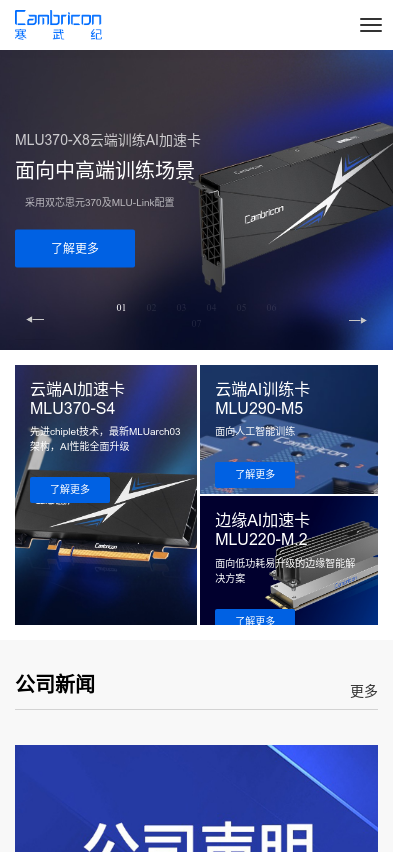
寒武纪公司发布声明警惕冒用名义进行虚假招聘,同时展示全算力产品和AI训练卡的市场实力。
- Key Focus Area
This company is primarily focused on developing artificial intelligence (AI) hardware, specifically high-efficiency general-purpose intelligent chips and acceleration cards. Their product offerings span various categories, including cloud, edge, and end-node AI processing solutions. They are heavily invested in advancing AI technology, particularly through their series of intelligent acceleration cards and systems such as the MLU370, MLU290, and MLU220 series, as well as edge computing modules and terminal processor IPs like Cambricon-1M and Cambricon-1H.
- Unique Value Proposition and Strategic Advantage
The company differentiates itself through its use of advanced chiplet technology, which allows them to package multiple AI computing units into a single chip. This approach yields high computational power and efficiency, offering more versatile and cost-effective AI chips tailored for different scenarios. Their strategic advantage lies in their proprietary MLUarch03 architecture, which enhances computation speeds and efficiencies significantly. Additionally, the integration of the MLU-Link multi-core interconnect technology allows for superior parallel processing and communication between chips and systems, enabling scalable AI training and inference tasks. The incorporation of LPDDR5 memory across their products maximizes bandwidth while maintaining low power consumption, boosting performance further.
- Delivering on the Value Proposition
The company implements its value proposition across several strategic fronts:
-
Innovative Chip Design: Utilizing advanced 7nm manufacturing processes and chiplet technology to integrate numerous transistors into compact formats, thereby maximizing computational throughput and memory bandwidth.
-
Software Ecosystem: They provide a comprehensive software development platform called "Cambricon NeuWare with MagicMind," which supports inferencing and training across their entire product line. The platform is built to facilitate seamless deployment of AI applications from development to production.
-
Scalability and Interoperability: The MLU-Link technology enhances the scalability of AI systems by providing significant cross-chip communication capabilities, which caters to distributed AI model training and inferencing. This facilitates the building of large-scale AI systems collaborating across multiple chips and accelerators.
-
Edge and Cloud Solutions: Their diverse product lineup, including edge computing modules and cloud AI acceleration cards, allows deployment flexibility across different environments, such as data centers and edge devices. They address multiple industries' needs, including intelligent manufacturing, smart finance, and autonomous vehicles.
Ultimately, this company positions its products as flexible, efficient, and high-performance solutions geared towards evolving AI computation demands across the cloud, edge, and endpoint landscapes.
Hailo

Hailo develops edge AI processing solutions, including accelerators and vision processors, to optimize deep learning applications across automotive, security, and industrial sectors.
Hailo Technologies Ltd. focuses on developing advanced AI processors specifically designed to enable AI on edge devices, enhancing performance while maintaining efficiency. Here's an overview of their main offerings and contributions:
Products:
-
AI Accelerators: These are co-processors designed to integrate with edge platforms, supporting real-time deep learning inference with low power consumption and cost efficiency. Key accelerators include:
- Hailo-8 & Hailo-8L AI Accelerator Modules: Available in various form factors like M.2 and mPCIe for different needs, offering up to 26 and 13 TOPS respectively.
- Hailo-8 Century High Performance PCIe Card: Delivers up to 208 TOPS for high-efficiency edge AI video analytics.
- Hailo-10H M.2 Generative AI Acceleration Module: Geared towards generative AI, supporting heavy AI models with minimal resource consumption.
-
AI Vision Processors:
- Hailo-15 Series: Tailored for smart cameras and includes variants like Hailo-15H, Hailo-15M, and Hailo-15L, offering enhanced AI analytics and video capabilities.
Software:
- Hailo AI Software Suite: Provides tools like the Dataflow Compiler for deploying neural network models efficiently on Hailo hardware.
- Developer Support: Extensive support for AI frameworks such as TensorFlow, ONNX, PyTorch, and more.
Technology and Innovation:
- Dataflow Architecture: A distinctive technology that enables efficient utilization of neural networks by adapting to their structure, which optimizes resource use and computational power.
Quality and Reliability:
- Quality Standards: Adopts ISO standards for quality management and environmental sustainability.
- Product Lifecycle Management: Ensures a lifecycle of 5 to 15 years and provides change notifications to manage product longevity and transitions.
Partner Ecosystem:
- Collaborates with hardware and software partners across various regions and segments to provide integrated solutions.
Applications:
Hailo’s processors are applicable in diverse sectors, including:
- Automotive: Advanced Driver Assistance Systems (ADAS), autonomous driving.
- Security and Surveillance: Intelligent transportation, access control, and perimeter protection.
- Retail and Industrial Automation: From point-of-sale systems to automated inspection and sorting.
- Generative AI: For applications requiring complex AI workloads.
Blogs and Resources:
Several articles highlight the key benefits and applications of edge AI technologies offered by Hailo, including:
- Balancing Privacy and Public Safety: Discusses edge AI as a solution for privacy-sensitive security applications, minimizing data transmission by processing locally.
- AI Smart Cameras: Explores how AI enhances camera capabilities, improving both video quality and analytics for various real-time applications.
Company Insights:
Hailo emphasizes a commitment to high-quality, reliable solutions while focusing on customer and environmental needs. They are proactive in customer feedback integration and continuous process improvement.
Partnerships & Customer Case Studies:
- Collaborations with companies like LeddarTech and engagements with partners in the intelligent transportation and surveillance sectors demonstrate the adaptability and scope of Hailo’s offerings.
Hailo Technologies aims to drive innovations in AI processing at the edge, making AI more accessible and impactful across industries while addressing privacy and efficiency concerns.
Habana
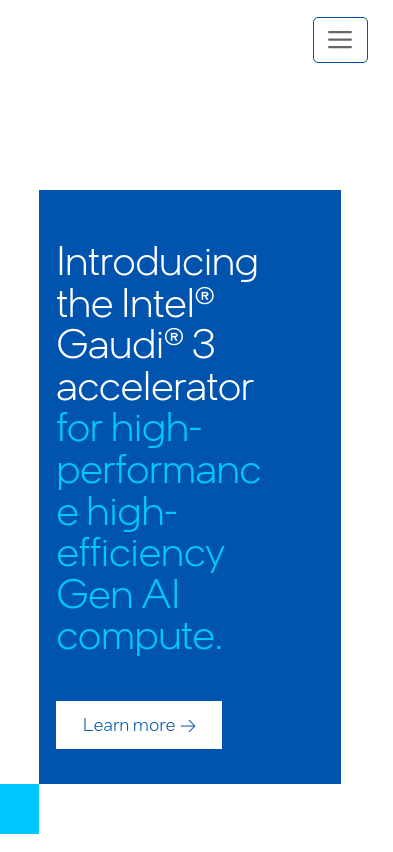
A leader in chip and semiconductor technology. A company that provides deep learning acceleration hardware and software that helps with high-performance computing and data center workloads.
About | About | About | About | About | About | About | About | About | About | About | About | News
Habana Labs, owned by Intel, primarily focuses on developing advanced AI accelerators, notably the Intel® Gaudi® series. These products are dedicated to enhancing performance and efficiency in AI computing, particularly for deep learning and generative AI applications.
Key Focus Area:
- The company's main focus lies in high-performance, cost-efficient AI accelerators tailored for training and inference of deep learning models. Their products are significant for industries including autonomous vehicles, healthcare, fintech, and retail that rely heavily on AI functionalities.
Unique Value Proposition and Strategic Advantage:
- Price-Performance Efficiency: Habana's Gaudi accelerators claim a significant edge in price-performance metrics, offering up to 40% better price-to-performance ratios than comparable Nvidia GPU solutions in some configurations.
- Scalability: The Intel Gaudi architecture includes features like integrated 100 GbE ports on every processor, enabling flexible and cost-effective scalability, a rare feature in AI chips that focuses on reducing total cost of ownership.
- Choice in AI Processing: By offering customisable hardware solutions such as air and liquid cooled versions, PCIe cards, and integrated server systems, Habana enables enterprises to choose configurations that suit their unique needs in terms of performance, scale, and power usage.
Delivery on Value Proposition:
- Hardware and Software Integration: Habana offers a comprehensive hardware-software ecosystem, making it easier to adopt and transition to their technology. Their software suite supports popular AI frameworks such as TensorFlow and PyTorch, streamlining the migration from existing GPU-based models.
- Cloud and On-Premise Deployment: The company positions its products for flexible deployment, allowing use within cloud environments (through partnerships with CSPs like AWS) and on-premises via setups from partners such as Supermicro.
- Developer Support and Community: Habana provides extensive resources for developers—such as tutorials, GitHub repositories, and community forums—which facilitate easier adoption and optimization of AI models on Gaudi processors, supporting both smooth transitions and innovations in AI model building.
Applications in Industry:
- Healthcare: AI for medical imaging analysis and diagnostic support has been a significant area, where Habana's technology aids in reducing R&D costs and speeding up research.
- Autonomous Vehicles: Gaudi processors support AI models in autonomous vehicle tech through efficient, scalable machine learning solutions.
- Financial Services: AI applications in fintech harness Habana processors to improve operational efficiencies in areas like customer service automation and real-time payment processing.
- Retail: In retail, AI-powered surveillance systems and inventory management are enhanced via Habana's solutions, enabling smart store technologies and checkout-free systems.
Overall, Habana Labs seeks to empower various industries with efficient, scalable AI solutions that are competitively priced, while providing flexible deployment options through their Gaudi AI processors and optimized software suite, embracing the growing needs of AI in enterprise applications.
BARO.AI

Offers tech-based marketing solutions for small to mid-size law firms.
-
Key Focus Area: The company's primary focus is on providing comprehensive AI infrastructure and ecosystems through a suite of total solutions designed to enhance AI research and development. This encompasses the deployment of cutting-edge Multi-GPU AI Servers, particularly under their POSEIDON line, aimed at streamlining complex AI processes such as training, inference, and analysis across a variety of domains.
-
Unique Value Proposition and Strategic Advantage:
- Advanced Cooling Technology: The company emphasizes its proprietary liquid cooling technology within the POSEIDON servers that minimizes thermal impacts and noise, maintaining performance integrity while being quieter than traditional air-cooled servers.
- Flexibility and Scalability: Their solutions provide the flexibility of setting up AI infrastructure without the need for extensive physical server rooms, thereby adapting to various space constraints. They offer scalable solutions with their Dynamic Scale-Up feature, which allows for seamless GPU upgrades to match research demand.
- Comprehensive AI Ecosystem: The company supports a broad AI development ecosystem including cloud and clustering solutions, providing a complete setup for AI processes ranging from initial research setups to advanced deployments.
-
Delivery on Value Proposition:
- Product Innovation: They are known for their POSEIDON range of servers, which utilize the latest NVIDIA GPUs including high-performance models like the H100. Their infrastructure supports intense workloads across multiple applications such as natural language processing (NLP) and computer vision.
- Support Infrastructure: BARO AI provides extended product warranties and emergency servicing to ensure operational stability. They also enable software optimization tailored to user needs, enhancing the utility and application of their hardware solutions.
- Patented Solutions and Client Achievements: The company holds patents for their unique PCB cooling block technology, demonstrating technical originality. This has contributed to notable client successes, such as aiding research teams to achieve leading positions in international AI competitions using their servers.
Through these offerings, BARO AI positions itself as a strategic partner in AI development, aiming to redefine standards in AI infrastructure and support organizations in pursuing more intelligent and efficient operations. Their growth and adoption by educational and research institutes underscore their role in enabling advanced AI capabilities.
Lablab.ai

Lablab.ai hosts hackathons and provides resources for AI and technology development, including partnerships with established organizations in the space and tech sectors.
About | About | About | About | About | About | About | About | About | About | About | About | About | About | About | About | About | About | About
- Key Focus Area of Lablab.ai:
Lablab.ai is centered around fostering innovation in artificial intelligence through community-driven events, particularly hackathons. These hackathons serve as a platform for AI professionals, tech enthusiasts, and domain experts from various fields to collaborate, create, and innovate with advanced AI technologies. The company aims to build a robust community of makers and innovators who are keen on developing the AI-native future.
- Unique Value Proposition and Strategic Advantage:
Lablab.ai uniquely positions itself as a facilitator of innovation by organizing AI hackathons that are both accessible and globally inclusive. Their strategic advantage lies in their ability to engage a diverse group of AI practitioners, innovators, and hackers to collaboratively solve undefined challenges. By not prescribing specific problems, they encourage creative solutions across sectors such as healthcare, public administration, and education. The company hosts frequent events where participants can utilize state-of-the-art AI technologies, engage in competitive yet cooperative environments, and receive mentorship from industry experts.
- How They Deliver on Their Value Proposition:
-
Hosting Hackathons: Lablab.ai conducts numerous hackathons that invite global participation. These events are structured to be inclusive, allowing both in-person and online participation, thus connecting a worldwide audience of AI enthusiasts.
-
Mentorship and Guidance: Throughout the events, participants receive guidance from seasoned mentors who provide domain expertise, insights, and address project-related queries. This mentorship is crucial in helping teams navigate technical challenges and refine their projects.
-
Use of Cutting-Edge Technologies: Participants have access to advanced AI platforms and models such as IBM Watson, Google's Gemma, Grok by xAI, and more. These tools facilitate the creation of sophisticated AI solutions across various domains.
-
Community and Network Building: Lablab.ai leverages its platform to build a community of innovators. By participating in their events, individuals can network with like-minded peers, forming teams that build solutions collaboratively.
-
Post-Hackathon Opportunities: Winners often receive invitations to further acceleration programs like Lablab NEXT, providing continued support to scale their prototype projects. Additionally, successful projects might gain further recognition and support, fostering an environment of sustained innovation beyond the hackathon itself.
By focusing on these aspects, Lablab.ai not only promotes AI innovation but also enhances individual skill development, professional networking, and the practical application of AI technologies to solve real-world problems.
Hayden AI
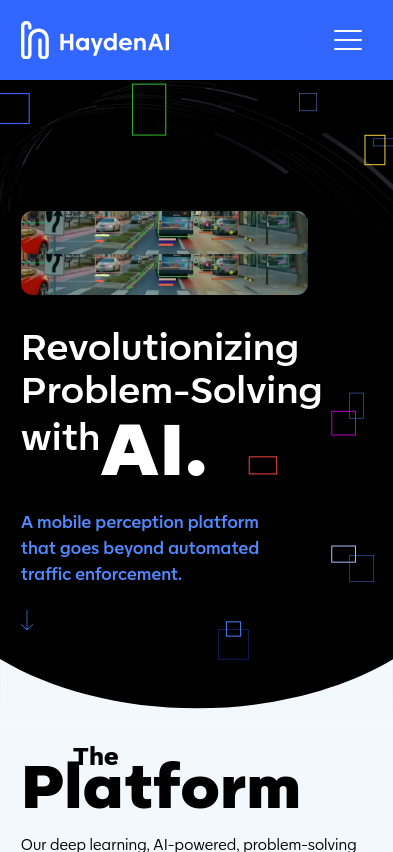
Hayden AI offers geospatial analytics and transit management services powered by AI technology.
Executive Summary
1) Key Focus Area: Hayden AI is primarily focused on leveraging artificial intelligence and geospatial analytics to solve urban mobility and traffic enforcement challenges. The company specializes in automated bus lane and bus stop enforcement systems, utilizing its AI-powered mobile perception platform. Their focus extends beyond traffic enforcement, aiming to enhance transit efficiency, safety, and sustainability across cities.
2) Unique Value Proposition and Strategic Advantage:
-
Disruptive Technology: Hayden AI claims to provide the only operational AI-based mobile perception platform that integrates data collection, analysis, and real-time enforcement capabilities. The combination of AI and geospatial analytics positions the company to offer comprehensive traffic solutions that can be scaled across various applications, including buses, trams, and other transit services.
-
Privacy First Approach: The company emphasizes data privacy by employing edge processing and encryption. This ensures only necessary information is processed and shared, which appeals to cities and transit agencies focused on maintaining compliance with privacy regulations.
-
Market Leadership: Hayden AI asserts its position as the largest provider of mobile automated bus lane and stop enforcement systems in the U.S., creating a notable market presence and paving the way for expansion into new geographies and markets.
3) Delivery of Value Proposition:
-
Technology Implementation: The core product is an AI-powered camera system placed on vehicles, such as buses, that detect traffic violations with high accuracy using machine learning and computer vision. This system automates the detection of unauthorized parking or movement of vehicles within bus lanes, enhancing transit speed and reliability.
-
Strategic Partnerships: Collaborations with technology partners like NVIDIA, Amazon Web Services, and various local government agencies aid in technological advancement and deployment efficacy. This network favors integration in different urban environments and supports broad deployment capabilities.
-
Sustainability Focus: The platform is designed to reduce emissions by improving transit efficiency and minimizing traffic congestion. Automated enforcement keeps lanes clear, purportedly boosting transit speed, and enhancing service reliability, thereby potentially increasing public transit ridership.
-
Ethical and Governance Framework: Hayden AI has implemented an AI Ethics Oversight Board and framework, aiming to uphold stringent ethical standards in AI usage, addressing concerns related to privacy and bias.
-
Cloud and Edge Computing: The integration of cutting-edge sensor fusion, mapping, edge AI, and cloud computing supports the real-time processing and management of data, allowing efficient scaling and effectiveness of traffic enforcement.
Conclusion: Hayden AI positions itself at the forefront of AI-driven urban solutions, focusing on addressing traffic management challenges with a robust emphasis on privacy and technological advancement. Its market leadership and strategic partnerships further sustain its trajectory towards revolutionizing urban mobility and infrastructure operations. However, the claims and achievements of the company should be viewed with discernment given the promotional context of the information provided.
Cogniac

Cogniac is a company focused on computer vision technology, offering a low-code AI platform that integrates with business operations to drive value from visual data. The company supports various industries including automotive, railway, manufacturing, safety and security, government, logistics, packaging, and partnerships with entities like Cisco Meraki.
-
Key Focus Area: Cogniac focuses on harnessing the power of artificial intelligence (AI) and computer vision technologies. The primary aim is to integrate these capabilities into various industrial sectors for enhanced performance and operational efficiency.
-
Unique Value Proposition and Strategic Advantage:
- Cogniac offers a low-code AI platform designed to drive value from visual data effectively and seamlessly into existing business infrastructures.
- The adaptability and scalability of their unique AI model allow multiple tasks to be executed simultaneously without the complexities of traditional computer vision platforms.
- Their strategy emphasizes continuous learning from imagery, which optimizes and refines performance as the platform is used.
-
How They Deliver on Their Value Proposition:
- Low-Code Platform: Cogniac's AI thrives on a platform that requires minimal coding, enabling even non-technical users to deploy and manage visual data analyses.
- Hyper Parameter Optimization: This technique allows Cogniac's AI to refine its models in real-time and adjust to variables quickly, reducing implementation time significantly.
- Agility and Scalability: The platform supports diverse deployment models across cloud and on-prem environments, providing flexibility for businesses to scale operations as required.
- Partnerships: By collaborating with organizations like Cisco Meraki, Cogniac leverages existing hardware systems to extend its computer vision capabilities. This enhances companies' data acquisition processes without major infrastructure changes.
- Diverse Industry Applications: Serving sectors like automotive, manufacturing, logistics, railway, and government, Cogniac addresses specific operational challenges through customized solutions, fostering enhanced safety, efficiency, and compliance across the board.
Overall, Cogniac positions itself as a versatile player in the AI landscape by adapting its offerings to fit the complex needs of various industries, emphasizing value creation from visual data through user-friendly and scalable technology solutions.
Cerebras Systems

Cerebras is a computer systems company dedicated to accelerating deep learning. The pioneering Wafer-Scale Engine (WSE) – the largest chip ever built – is at the heart of our deep learning system, the Cerebras CS-1.
Leadership | About | ESG | About | About | Foundation | News
Cerebras Systems primarily focuses on developing and utilizing high-performance computing solutions to accelerate artificial intelligence (AI) and machine learning (ML) processes. Their mission is to address computational bottlenecks and facilitate advancements across numerous industries, including healthcare, pharmaceuticals, energy, government, and financial services. Cerebras achieves this through their innovative hardware and software solutions, notably their Wafer Scale Engine (WSE-3) and Cerebras AI supercomputers.
Unique Value Proposition and Strategic Advantage:
-
Wafer Scale Technology: Cerebras’ Wafer Scale Engine (WSE-3) is central to their strategic advantage. It is claimed to be the fastest AI processor available, providing unparalleled performance in terms of AI-optimized cores, memory speed, and on-chip bandwidth. This enables computational tasks that would traditionally require expansive, multi-server GPU setups to be accomplished within a single, compact system.
-
Efficiency and Speed: The company emphasizes their systems' ability to perform AI tasks significantly faster and more efficiently than conventional setups. For example, their platforms reportedly enable the training of large language models and execution of complex simulations much quicker than legacy systems, therefore reducing the time and resources needed for AI workloads.
-
Scalability and Flexibility: Cerebras offers a scalable and flexible solution that allows for the training and fine-tuning of large AI models. Their products are marketed as being easy to deploy and maintain, with the capacity to handle billions of parameters which is pivotal for expansive datasets and complex AI models.
Value Delivery:
-
Product Offerings: Cerebras provides a range of products including AI supercomputers, inference engines, and AI model services. These offerings are designed to cover various aspects of AI project lifecycles, from model training and deployment to inference.
-
Collaboration with Institutions: They partner with leading institutions, like the Mayo Clinic and Sandia National Laboratories, to tailor AI solutions that meet specific needs. For instance, their collaboration with Mayo Clinic focuses on developing genomic models for improved medical diagnostics and personalized treatment plans.
-
Industry Applications: Cerebras’ systems are applied in diverse fields such as healthcare for drug discovery, government for enhanced public sector services, and energy for seismic modeling, among others. This versatility underscores the breadth of their hardware's application in various complex computational scenarios.
-
Services and Support: Beyond hardware, Cerebras provides extensive support via documentation and developer resources to ensure optimized utilization of their technologies. They offer services to help companies quickly train state-of-the-art AI models tailored to specific business needs.
Cerebras Systems positions itself as an enabler of advanced AI capabilities by providing a robust hardware-software ecosystem, aiming to streamline and accelerate AI processes across industries through its proprietary technologies.
Enfabrica

Enfabrica develops networking hardware to drive AI workloads.
Enfabrica is focused on the development of high-performance networking solutions specifically engineered for artificial intelligence (AI) and accelerated computing infrastructure. Central to this focus is their 3.2 Terabit per second (Tbps) Accelerated Compute Fabric (ACF) SuperNIC chips. These products aim to transform data center operations by enhancing the performance, scalability, and resiliency of AI networks, allowing for more efficient management of high volumes of data typically required in large-scale AI operations.
The company's unique value proposition lies in its holistic approach to AI networking solutions. Enfabrica highlights the advantages of its SuperNIC technology, which integrates both hardware and software to provide higher bandwidth, greater multipath resiliency, and full-stack programmability. This technology is designed to eliminate conventional bottlenecks, offering up to eight times the elastic bandwidth for GPUs without experiencing congestion. One of the most notable features is its ability to support large AI clusters with more than 500,000 GPUs, facilitated by a unique low-latency, two-tier network design.
Enfabrica delivers its value proposition through a combination of innovative product design and strategic industry partnerships. Their ACF SuperNIC chips and systems enable seamless connectivity within AI clusters, eliminating complex networking sprawl with a single device that functions across different endpoints, including GPUs, accelerators, and memory storage. This is achieved by their software-defined networking capabilities and resilient message multipathing technology, which improves uptime and efficiency, even amid network disruptions.
Furthermore, Enfabrica's strategic alliances, supported by significant Series C funding of $115 million from notable investors, are tailored to accelerate the production and deployment of these next-gen networking solutions. The firm collaborates with prominent industry players like Arm and Cisco, ensuring its solutions are integrated into cutting-edge server and networking systems, further driving the evolution of AI infrastructure.
In conclusion, Enfabrica's commitment to advancing the networking capabilities for AI data centers is anchored in their design of scalable and resilient networking solutions. Their SuperNIC technology is positioned to cater to the growing demand for efficient, high-performance AI infrastructure, offering a distinct advantage in managing large-scale AI computing loads effectively.
Rebellions.ai

Rebellions.ai builds AI accelerators by bridging the gap between underlying silicon architectures and deep learning algorithms.
Rebellions, a South Korean semiconductor company, has centered its business on the development and production of energy-efficient AI inference chips. Their mission is to enable efficient and scalable generative AI solutions, focusing on the demands of contemporary and future AI workloads.
Key Focus Area: Rebellions specializes in crafting advanced AI chips, particularly for powering AI inference tasks. This involves creating semiconductors utilized primarily in data centers and cloud services, accommodating demanding AI applications, such as large language models and high-frequency trading.
Unique Value Proposition and Strategic Advantage: Rebellions positions itself as a strategic player in the field of AI semiconductors by:
-
Energy Efficiency: The chips developed by Rebellions emphasize maximum core utilization for high energy efficiency, especially for intensive AI workloads. Their architecture is designed to ensure no core is idle.
-
Scalability: Their products are designed to accommodate scalability from single chips to full data racks, facilitating growth with changing business needs. This modular and scalable design makes their technology versatile across various applications and industries.
-
Local Ecosystem and Strategic Partnerships: A key advantage is the local integration within the South Korean technological ecosystem, bolstered by partnerships with tech giants like Samsung Electronics. This positions them uniquely for significant domestic semiconductor capabilities while expanding globally.
Delivering on their Value Proposition: Rebellions advances its strategic goals and delivers on its value propositions through:
-
Product Development: The company offers products like the REBEL HBM3e chip, designed for hyperscale workloads with high compute density and the ATOM™ series focused on low-latency, efficient AI inference. These products leverage high-speed, energy-efficient processing suitable for diverse AI models.
-
Technology and Innovation: In development with Samsung, Rebellions uses cutting-edge fabrication processes, notably the 4nm and high-bandwidth memory technologies, to enhance product performance and efficiency.
-
Strategic Mergers and Investments: Rebellions’ merger with SAPEON Korea and securing of significant investments during funding rounds indicate strong backing and trust in its innovative capacity and market potential. Such capital allows further global expansion and talent acquisition, enhancing their development capabilities.
-
Engagement with the AI Ecosystem: Their software stack, including the RBLN SDK, supports a wide range of ML models and features, aiming to ease deployment and integration into AI services, ensuring products meet diverse AI infrastructure needs.
In summary, Rebellions aims to offer high-energy-efficiency AI chips that are scalable and suitable for a breadth of applications. While utilizing South Korea's semiconductor manufacturing capabilities and forging critical international partnerships, it strives to maintain its competitive edge in the rapidly evolving AI market.
Axelera

Axelera is working to develop AI acceleration cards and systems for use cases like security, retail and robotics.
Key Focus Area
Axelera AI is dedicated to advancing AI technologies with a focus on edge computing solutions. Their primary industry application is in accelerating inferencing for computer vision tasks within edge devices. They aim to enable efficient, cost-effective, and high-performance AI solutions specifically tailored for applications in the security, retail, and industrial sectors, among others. This approach allows users to process data insights rapidly and efficiently without the constraints typically associated with traditional cloud-based AI systems.
Unique Value Proposition and Strategic Advantage
Axelera AI's distinctive advantage lies in their development of a comprehensive hardware and software ecosystem, specifically designed for edge AI applications. The heart of their offering is the Metis AI Processing Unit (AIPU) which utilizes proprietary Digital In-memory Computing (D-IMC) technology in conjunction with RISC-V architecture. This combination promises to deliver:
- High Performance and Efficiency: The Metis AIPU can achieve up to 214 TOPS, offering significant computational power while maintaining energy efficiency.
- Cost Effectiveness: By utilizing D-IMC and standard CMOS technologies, Axelera's solutions aim to be more cost-effective than traditional GPU-based alternatives.
- Scalability: Their hardware can be scaled and integrated into existing systems using familiar interfaces like PCIe and M.2, which facilitates ease of deployment and future-proofing for users.
Delivering on Value Proposition
Axelera AI fulfills its pledge to provide cutting-edge AI acceleration through several initiatives:
-
Technological Innovation: Their Metis AIPU and the accompanying Voyager SDK offer an integrated hardware-software solution that simplifies deploying AI models on edge devices. The D-IMC technology ensures high computational efficiency while reducing power consumption.
-
Ecosystem Partnerships: Collaborations with established platforms such as Arduino expand the accessibility and applicability of their AI solutions. These partnerships aim to integrate high-performance AI capabilities into a broader range of devices and applications.
-
Product Offerings: Axelera provides hardware options, including evaluation kits and AI acceleration cards, that simplify the integration of AI into existing infrastructure, thus reducing both time-to-market and operational costs for end users.
-
Application Versatility: Their solutions are suitable for multiple applications such as multi-channel video analytics, safety monitoring, and real-time operational intelligence, enabling a diverse range of industries to leverage AI efficiently.
-
Sustainability Focus: Axelera AI promotes running high-performance AI applications on-device, reducing dependency on power-intensive cloud solutions and contributing to lower carbon emissions.
In sum, Axelera AI strategically positions itself to accelerate AI innovation, empowering industries to deploy efficient edge AI applications with reduced cost and energy consumption while maintaining significant computational capability.
Abacus.AI

Abacus.AI enables businesses to implement AI without needing expert developers by offering pre-trained models for tasks like customer service and forecasting. Abacus.AI offers pre-trained models for business tasks like customer service, simplifying AI implementation without expert developers.
News | About | About | About | About | About | About | About | About | About | About | About | About | About | Vision/Values | About | Vision/Values | About | About | About | About | About | About | About | About | About | About | About | About | About | About | About | About | About | About | About | About
-
Company's Key Focus Area: Abacus.AI is primarily focused on providing AI-driven solutions tailored for both individual professionals and large enterprises. Their main goal is to automate and enhance business processes through the use of AI technology. This includes a broad range of applications, such as predictive modeling, personalization, anomaly detection, and AI-based decision-making tools. They offer platforms and tools to build AI agents and chatbots, optimize resources through discrete optimization, and utilize vision AI for modeling tasks.
-
Unique Value Proposition and Strategic Advantage: Abacus.AI positions itself as an AI super-assistant that leverages generative AI technology to automate various business processes. Their strategic edge lies in their state-of-the-art AI capabilities, including structured machine learning, vision AI, and personalized solutions, along with a commitment to open-source generative AI models. They claim that their AI systems can enhance productivity and efficiency by automating complex tasks and reducing human intervention.
-
Delivery on Their Value Proposition: To deliver on its value proposition, Abacus.AI employs:
-
AI Super Assistants: Tools like ChatLLM and CodeLLM are designed to integrate AI capabilities across platforms, providing services like web search, image generation, and code editing.
-
Comprehensive AI Platform: For larger organizations, they offer a platform capable of building enterprise-scale AI systems, using AI to create and manage other AI agents and processes. This platform aims to automate tasks such as fraud detection, contract analysis, and personalized marketing.
-
Structured ML and Predictive Modeling: Abacus.AI provides tools to create machine learning models tailored to specific data inputs, ensuring accurate business predictions and process optimizations.
-
Vision AI and Optimization: These services offer advanced solutions for image analysis and optimizing business processes under given constraints, aimed at reducing costs and increasing efficiency.
-
Integration and Customization: The company offers integration with existing data systems, allowing for customization and personalized setups that fit specific business needs and enable contextual AI interactions.
-
Consultation and Support: They provide consultations to help enterprises tailor the AI solutions to their specific requirements and offer support throughout the implementation process.
-
Overall, their approach focuses on using cutting-edge AI models and deep learning techniques to build custom solutions that improve business process efficiency and decision-making.
Sambanova
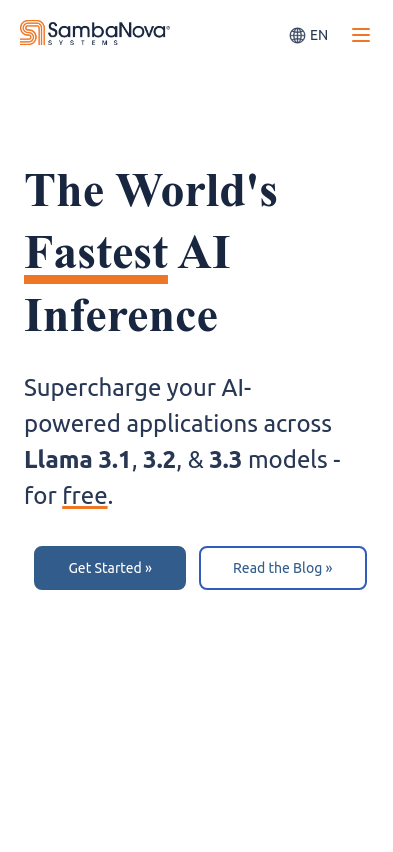
Sambanova Systems develops integrated software and hardware platforms to support advanced AI applications.
SambaNova Systems is primarily focused on providing a comprehensive AI platform tailored for the development and deployment of generative AI, offering the technology backbone for next-generation AI computing. Their solutions target both enterprise and governmental sectors, addressing the demands of AI-enabled businesses through advanced technological innovations.
Key Focus Area: SambaNova's primary focus is on deploying state-of-the-art AI and deep learning capabilities to enable organizations to gain a competitive edge. They offer specialized platforms for generative AI, utilizing their proprietary DataScale® system, targeted at a variety of uses including public sector applications, scientific research, and sovereign AI efforts.
Unique Value Proposition and Strategic Advantage:
- Full-Stack Platform: SambaNova delivers an enterprise-grade full stack platform, ranging from chips to models, purpose-built for generative AI. Their offerings include both software and hardware solutions that are specifically designed to handle large-scale AI workloads with improved efficiency and scalability.
- RDU Technology: Their SN40L Reconfigurable Dataflow Unit (RDU) stands as a GPU alternative, designed to power demanding AI workloads. This technology offers advantages in memory capacity and model execution speed, purportedly achieving better performance metrics than traditional GPU-based systems.
- Model Ownership and Data Privacy: SambaNova emphasizes data security and privacy, ensuring that customers own their AI models and maintain control over their data, purportedly offering advantages over cloud-based AI models that might pose vendor lock-in issues.
How They Deliver on Their Value Proposition:
- SambaNova Suite: This platform includes SambaNova DataScale, SambaStudio software for infrastructure management, and the Composition of Experts (CoE) model architecture, claimed to deliver unprecedented performance and scalability for AI workloads across various sectors.
- Innovative AI Hardware: Their hardware solutions are engineered for efficiency, providing a small footprint and lower energy consumption. The DataScale system aims to facilitate both training and inference with significant performance gains over competing GPU-based systems.
- Resources and Support: SambaNova offers a comprehensive support system, including resources such as webinars, white papers, and starter kits to accelerate AI deployment for businesses.
- Sovereign AI Initiatives: For governmental bodies and large enterprises, SambaNova provides tailored solutions to support sovereign AI development, allowing these entities to build and maintain their own AI infrastructure.
- Startup Accelerator Program: SambaNova also supports early-stage startups through their accelerator program, offering resources and higher usage limits to facilitate the creation of advanced AI applications.
In essence, SambaNova seeks to differentiate itself with a robust, integrated, and customizable AI platform that is tailored to meet the diverse needs of enterprise and government customers while addressing significant concerns around data privacy and model ownership.
NVIDIA

NVIDIA is a leading producer of AI hardware, renowned for its GPUs and plays a pivotal role in the AI chip market, being a revenue and volume leader.
-
Key Focus Area: NVIDIA's primary focus is on accelerated computing technology designed to power artificial intelligence (AI) and other computationally intensive tasks across various sectors. They cater to industries such as healthcare, automotive, gaming, manufacturing, and more, capitalizing on their hardware and software capabilities to optimize AI and data processing workloads.
-
Unique Value Proposition and Strategic Advantage: NVIDIA distinguishes itself by offering cutting-edge hardware like GPUs and AI supercomputers, and supporting software platforms that enable efficient AI computation and application. Their strategic advantage lies in the development of tailor-made solutions such as NVIDIA RTX, the Omniverse platform for 3D workflows and collaborative design, and cloud-based AI services. NVIDIA’s partnerships with key tech giants like Microsoft and Google for AI and data processing enrich their service offering, enabling comprehensive solutions for enterprise AI needs.
-
How They Deliver on Their Value Proposition:
-
Product Range: The company offers a wide spectrum of products, including GeForce graphics cards for gaming, the DRIVE platform for autonomous vehicles, and the DGX platform for AI training. Their offerings extend to software, such as the AI Enterprise suite and specialized AI tools for various industries.
-
Platform Initiatives: NVIDIA advances AI applications through initiatives like Project DIGITS, allowing local and cloud-based AI computational tasks, and Cosmos, which accelerates AI development for physical systems like robotics and autonomous vehicles. Their efforts in the metaverse, through the Omniverse platform, demonstrate their commitment to virtual simulation and 3D development.
-
Innovative Solutions: NVIDIA emphasizes high-performance computing (HPC) with solutions like CUDA-based parallel computing and deep learning frameworks that enhance scientific research and design processes. Their focus on delivering AI tools for sectors like healthcare and entertainment showcases their ability to impact diverse fields.
-
Collaborations and Partnerships: They strategically align with industry leaders such as Microsoft, Google, and Oracle to integrate their technologies into broader enterprise ecosystems. These collaborations enhance NVIDIA's reach and influence in deploying scalable AI solutions.
-
Training and Support: NVIDIA supports the adoption of its technologies through extensive resources, including technical training, support for developers, and comprehensive solution catalogs that facilitate easier implementation of their platforms and products.
-
These strategic initiatives enable NVIDIA to maintain its position in advancing AI capabilities and catering to an increasingly digital-first world, impacting industries by solving complex computational problems and innovating upon AI-driven solutions.
Intel
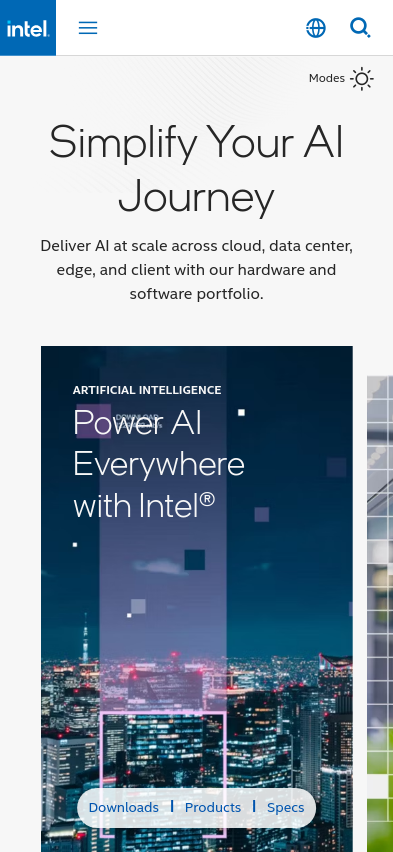
Intel is a market leader in CPUs, expanding its influence in the AI sector with products like the Gaudi 3 chip, aiming to catch up in the GPU arena.
Leadership | About | About | Leadership | About | About
Intel's Strategic Focus and Deliverables
1) Key Focus Area:
Intel is highly focused on Artificial Intelligence (AI) innovation across various industries and technological platforms. Their efforts span from traditional areas like processors and computing hardware to cutting-edge solutions that integrate AI across data centers, cloud computing, and enterprise systems.
2) Unique Value Proposition and Strategic Advantage:
- Open Platform for Enterprise (OPEA): Intel provides a comprehensive AI ecosystem that includes silicon, software, and tools, allowing enterprises to harness AI's potential across devices from PC to edge and data centers. This strategy is aimed at various industries, including financial services, manufacturing, healthcare, and retail.
- AI-Powered Performance: Their newest product offerings, such as the Intel® vPro® PCs and Core™ Ultra processors, are tailored to enhance productivity with integrated AI capabilities, improving everything from security to computing efficiency.
- Scalability and Edge Solutions: Intel's platforms, such as the Tiber™ AI Cloud, are designed to streamline the deployment of AI solutions at an enterprise scale and across edge environments.
- Enterprise Solutions: Intel underscores the capability of their systems to glean actionable insights from data, driving automation and enhancing decision-making processes, which serves as a significant business advantage to clients.
3) Delivering on the Value Proposition:
- Comprehensive Product Portfolio: Intel offers a wide range of products including processors (Intel® Core™ Ultra and Intel® Xeon®), graphics solutions with their Arc™ series, and AI accelerators, which support AI workload demands.
- Tools and Partnerships: With resources like the OpenVINO™ toolkit for AI model optimization and the oneAPI Toolkits for unified programming, Intel caters to developers seeking efficiency and innovation. They also leverage extensive partnerships for joint solutions and industry standards.
- Enhanced Security and Manageability: Intel platforms focus on security with hardware-level protections and remote management capabilities, critical for enterprise environments.
- Empowering the Workforce: Solutions like Intel vPro® are aimed at fortifying businesses with robust security tools and optimizing device management, thus allowing tech teams to focus more on innovation than maintenance.
- Development Resources: Through its Developer Zone and resources, Intel promotes easy access to its software tools and solutions that support innovation, scalability, and performance optimization. This aids developers in crafting solutions easily across various technology stacks.
- Evidence of Impact: Intel documents case studies, such as those with financial and agriculture sectors, demonstrating their AI solutions achieving significant efficiency improvements and cost reductions.
Final Thoughts:
Intel continues to strategically position itself as a provider of diverse technological platforms and solutions, placing special emphasis on AI innovations. By emphasizing scalable and secure solutions supported by a robust hardware and software ecosystem, Intel aims to not only meet but guide the evolving demands of enterprise-level computing and AI applications.
Huma.AI

Huma.AI is a leading generative AI platform for life sciences, providing advanced insights and data-driven solutions to accelerate drug development and improve healthcare outcomes.
Huma.AI Overview: Key Insights for Executive Audience
1. Company's Key Focus Area: Huma.AI is centered on empowering the healthcare and life sciences sectors by accelerating decision-making processes. They achieve this through their generative AI platform, designed to extract, synthesize, and process data and insights from a wide range of complex data sources. Their primary goal is to streamline the analysis of clinical evidence, market trends, and internal research to aid in strategic business decision-making.
2. Unique Value Proposition and Strategic Advantage:
-
Generative AI Application: Huma.AI differentiates itself by harnessing generative AI technology to simplify the extraction and synthesis of insights from large volumes of data. This capability enables users to construct a comprehensive and tailored view of their data landscape, optimizing the decision-making process.
-
Single-Tenant Environment: Each client is provided a dedicated environment for their data, ensuring confidentiality and protection, which can be critical in sectors handling sensitive health data.
-
Automated Insight Generation: The platform’s automation reduces the time required for insight generation from days or weeks to minutes. This enhances agility and responsiveness to evolving market and scientific landscapes.
3. How They Deliver Their Value Proposition:
-
Diverse Functional Modules: Huma.AI provides various modules such as literature review, congress materials analysis, CRM data consolidation, market research, research study ingestion, and ad board feedback tracking. These tools are designed to tackle different aspects of data analysis and insight generation, specific to the needs of healthcare and life sciences.
-
User-Friendly Interface: Through an interface that supports everyday language queries, the platform facilitates rapid access to information, allowing users to ask questions and receive fast, relevant answers.
-
Robust Security Measures: The company maintains stringent security protocols, adhering to SOC 2 Trust Service principles, utilizing AWS infrastructure for encrypted data storage and transmission, and routine security reviews to uphold data integrity and confidentiality.
-
Comprehensive Data Handling: Capabilities include the ingestion of public and private data, advanced real-time data analysis, and seamless data export, fostering collaborative insights within teams.
Huma.AI positions itself as a strategic partner in enhancing efficiency and productivity in decision-making processes for its clients in healthcare and life sciences, leveraging cutting-edge AI technology to transform data into actionable insights.
Altamira

Altamira is a company that offers a range of software development services, including custom software development, software integrations, and web development. They also provide consulting services for AI, data and analytics, and offer team augmentation and dedicated development teams.
Altamira is a software development company with a strategic emphasis on providing tailor-made solutions for businesses at various stages of growth, particularly focusing on scaling up and system optimization.
Key Focus Area: Altamira primarily focuses on software development and consultancy services, covering areas like custom software development, mobile and web application development, AI consultancy, and vendor audit and transitions.
Unique Value Proposition and Strategic Advantage: Altamira offers a comprehensive suite of services designed to address common challenges faced by businesses as they scale. A key component of their strategy is their discovery phase, a pre-development process that helps to clarify scope, validate ideas, and mitigate risks. This is bolstered by their unique vendor audit and transfer framework, which aims to ensure seamless transitions between service providers, avoiding potential disruptions. Their consultancy and audit services stand out by providing deep insights into existing processes and recommending operational improvements, thus allowing for enhanced efficiency and sustainability.
Delivery on Value Proposition:
-
Comprehensive Services: Altamira provides a wide range of services from software auditing and consulting to custom development and vendor management. This scope ensures that their clients can find solutions tailored to their specific needs, whether they are startups or large enterprises.
-
Discovery Phase: They promote a well-defined project initiation phase to help clients better understand their development needs. This is designed to reduce uncertainties and improve budgeting and timeline predictions, thereby creating a solid foundation for subsequent development work.
-
Vendor Audit and Transition: By focusing on smooth vendor transitions and thorough vendor evaluations, Altamira minimizes operational disruptions. They employ a structured vendor audit to identify and rectify inefficiencies, ultimately optimizing vendor relationships and outcomes.
-
AI and Modern Development Practices: Altamira leverages advanced technologies such as artificial intelligence, no-code/low-code platforms, and data analytics to enhance productivity and reduce time-to-market. This approach is particularly beneficial for businesses looking to scale their operations swiftly and effectively.
-
Software Development Consultancy: The consultancy aspect delves into refining technology strategies and aligning them with business objectives. Altamira assesses technology stacks, architecture, and processes to ensure they are fit for purpose and scalable.
-
Quality and Compliance: The company places emphasis on compliance and security standards across their services, ensuring that all deliverables meet regulatory requirements and industry best practices.
In conclusion, Altamira's blend of software development services, strategic planning through discovery, and comprehensive vendor management capabilities equips them to address the multifaceted challenges businesses face while scaling. They focus on ameliorating development bottlenecks and paving the way for sustained growth and innovation.
RaiderChip

RaiderChip is developing a hardware IP core to accelerate generative AI inference on FPGA platforms, emphasizing small to large language models.
Company Focus Area
RaiderChip is a hardware design company specializing in developing neural processing units (NPUs) for generative artificial intelligence (AI). The company's primary focus is accelerating large language models (LLM) on low-cost field-programmable gate arrays (FPGAs). These accelerators aim to advance AI processing efficiency and operate generative AI models entirely locally, without requiring cloud or subscription services. RaiderChip aims to target the burgeoning edge AI market, engaging in embedded solutions capable of running independently from internet connections.
Unique Value Proposition and Strategic Advantage
RaiderChip's unique value proposition lies in offering clients a cost-effective, local AI acceleration solution that prioritizes privacy and efficiency. Their strategic advantage comes from leveraging decades of experience in low-level hardware design to deliver NPUs that maximize memory bandwidth and computational performance, essential for running complex generative AI models efficiently. RaiderChip offers versatile and target-agnostic solutions that work seamlessly with FPGAs and ASIC devices from various suppliers such as Intel-Altera and AMD-Xilinx.
Key differentiators include:
- Fully hardware-based generative AI acceleration, ensuring deterministic performance and energy efficiency.
- Capability to run models offline to ensure data privacy and independent operations, ideal for applications in sensitive areas such as defense, healthcare, and consumer electronics.
- Support for rapid integration of new LLMs and customer-specific fine-tuned AI models without hardware modifications.
Delivering on Their Value Proposition
To drive its mission forward, RaiderChip focuses on several key strategies:
-
Advanced Technology and Design: Their NPUs are specifically optimized for the Transformers architecture, which is foundational for the majority of LLMs. This allows them to process models without the need for additional CPUs or Internet connections.
-
FPGA-based Approach: RaiderChip uses the reprogrammable nature of FPGAs, making their deployed systems adaptable to emerging AI models and updates without significant hardware changes.
-
Quantization Support: By offering models with full floating-point precision and quantized variants, RaiderChip caters to diverse computational needs, providing flexibility and efficiency, especially in resource-constrained environments.
-
Local and Interactive Evaluations: RaiderChip provides interactive demos that allow potential customers to test and evaluate the capabilities of their generative AI solutions, emphasizing a hands-on approach.
-
Frequent Model Support Expansion: Aligning with market trends, they consistently add support for new models like Meta’s latest Llama releases and Falcon from TII of Abu Dhabi, enabling versatile AI applications across different languages and regions.
RaiderChip’s investments in research and development are supported by their recent seed round of one million Euros, further accelerating their growth in a field that continuously evolves with rapid technological advancements. By focusing on local AI acceleration for both performance and privacy, RaiderChip positions itself as a pioneer in generative AI deployment, particularly for applications requiring significant computation near the source of data generation or decision-making.